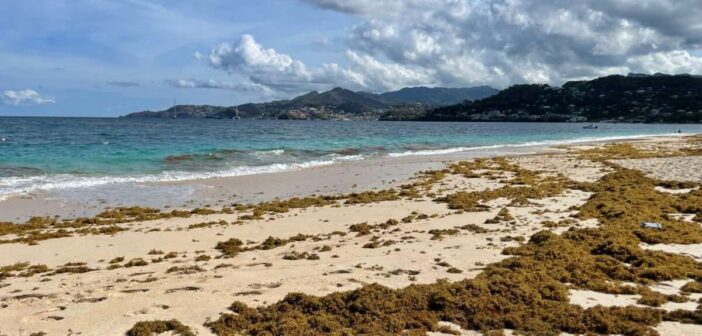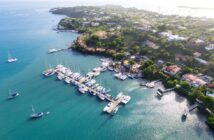The Ministry of Climate Resilience, the Environment, and Renewable Energy and the Ministry of Blue Economy and Marine Affairs jointly reaffirm the Government of Grenada’s unwavering commitment to tackling the ongoing Sargassum influx with bold, coordinated, and innovative action. As the seaweed crisis continues to challenge coastal communities and vital economic sectors, Grenada is advancing a forward-looking strategy that is setting the bar for regional leadership.
Speaking during a national town hall meeting on Wednesday 23rd, Honourable Kerryne James, Minister for Climate Resilience, the Environment, and Renewable Energy, underscored the gravity of the issue:
“The seriousness of the Sargassum threat, which continues to impact Grenada’s coastal ecosystems, fisheries, tourism, and community livelihoods, cannot be ignored. Sargassum is not just seaweed washing ashore. It is a persistent threat to our way of life — and we are taking bold, coordinated action to address it.”
Grenada has firmly established itself as a regional leader in Sargassum response. A standout moment came when the country proudly hosted the 2nd Caribbean-EU Global Gateway Conference on Sargassum from October 1 to 2, 2024. The landmark event brought together regional governments, scientists, entrepreneurs, and development partners to accelerate innovation, strengthen collaboration, and unlock sustainable investment opportunities.
Building on that momentum, Grenada, in partnership with the European Union, convened the inaugural Grenada-EU Task Force on Sargassum Valorisation in December 2024. From that session emerged an ambitious national commitment: to process 10,000 tonnes of Sargassum by 2026—a pledge made by Prime Minister Dickon Mitchell as part of Grenada’s vision for a green-blue economy.
In a strong show of private sector engagement, a national Expression of Interest (EOI) launched in early 2025 attracted 31 innovative proposals. Of these, 13 companies have been shortlisted and are now undergoing detailed technical and financial evaluation.
Grenada is not just planning—it is acting. In February, the Grenada Solid Waste Management Authority (GSWMA) activated its 2025 Sargassum Operational Response Plan, with tangible results already visible:
✦ 32 temporary workers were deployed in high-impact areas like Marquis and Soubise to support shoreline cleanup.
✦ Collected material transported to Telescope for safe storage and potential reuse.
✦ Cleanup operations expanded to west coast beaches in collaboration with the Grenada Tourism Authority from April 23.
✦ Deployment of Coast Guard Yamaha vessels equipped with floating barriers and trawl nets to capture Sargassum at sea.
✦ Strategic landings at Grand Mal and Gouyave Jetties, with transfer to Perseverance Landfill for assessment and safe disposal.
These interventions are protecting key tourism zones, easing the burden on coastal infrastructure, and building breathing room for longer-term valorisation strategies to take root.
Recent meteorological data indicate that the Sargassum surge on the West Coast coincided with a shift in wind patterns. Forecasts for April 24, 2025, predicted sustained easterly trade winds of about 5–10 knots over Grenada’s waters, and Caribbean Institute for Meteorology and Hydrology observations on that date recorded southeasterly winds near 19 km/h. This change from the usual northeasterly trades would naturally drive floating Sargassum toward Grenada’s sheltered west coast, explaining the sudden influx in those areas.
Grenada’s capacity to deliver on these ambitious goals has been further strengthened by the arrival of a Sargassum Valorisation Specialist, deployed through EU support. This expert is working directly with local teams on advanced technical planning, scalable project development, and institutional capacity building. This deployment represents a significant step in ensuring Grenada’s response is grounded in science, efficiency, and long-term sustainability.
Minister James emphasised that Grenada is not merely reacting to environmental challenges—it is reshaping the regional narrative around Sargassum:
“We are turning this challenge into a national development opportunity — creating jobs, supporting innovation, and building resilience.”
Ambassador Jerry Enoe, Special Envoy for Oceans, highlighted Grenada’s proactive leadership, stating:
“Grenada is leading by example in confronting ocean challenges. We are not only protecting our coasts but also unlocking new opportunities for jobs, investment and environmental innovation across the region.”
With strengthened partnerships, a clear roadmap, and growing global attention, Grenada is building a model of integrated Sargassum management—one that can inspire replication across the Caribbean and beyond.
The Ministry urges all citizens, stakeholders, and partners to stay engaged as Grenada continues to transform this environmental challenge into a catalyst for innovation and sustainable growth. The Government of Grenada remains steadfast in its commitment to protecting our people, coasts, and marine ecosystems—laying the foundation for a resilient, climate-smart future.
![]()




